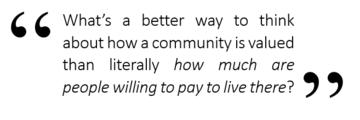Start the Week
WEALTHPOL PI Ben Ansell was interviewed by Andrew Marr on BBC Radio 4’s Start the Week on 6th January 2020. You can listen to the whole episode, entitled ‘A house and a home’, via BBC Sounds here. What follows here is a transcribed precis of the first part of what Ben spoke about, specifically related to housing and Brexit. For more by Ben on this topic, take a look at his OxPol blog or recent Times piece.
The surprising thing about house prices and the correlation between how much a house is worth and how its inhabitants vote is exactly that, the correlation. In the 1980s house prices predicted voting brilliantly: in the poorest 10% of constituencies by house prices, Labour had a 25 point lead; and in the richest 10% the Tories had a 25 point lead. So if you walked past an estate agent, you could tell how a constituency would vote. However, if you look at the 2019 election, just a generation or so later, there is almost no relationship at all. That is, Boris Johnson did almost equally well in the poorest areas and in the richest areas. And the reason for this is Brexit. The Brexit vote cut right across our traditional patterns of class voting in the UK. Expensive areas have traditionally voted Conservative, but they also voted Remain. Places with cheaper houses traditionally voted Labour, but they also voted for Leave. So that split both parties in half, and that traditional class voting pattern that we saw and we thought we could rely on to explain voting choice collapsed in this election.
There is good reason to believe that if you own a house in an expensive area, you’re going to benefit from house price rises. So it makes a lot of sense, if you own a house in an expensive area, to vote for parties who are more likely to encourage house prices to rise (and who are less likely to tax you on that wealth afterwards), and traditionally that’s been the Conservative party. But for the 2019 election, if you were a staunch Remainer in one of these areas which had done well, you might not have been so keen to vote for the Conservatives. Or, on the other hand, if you were from a poorer area which had always voted Labour, you might have gone over to the Conservatives as more aligned with your Leave values. And this was something which we saw playing out across the board.

Many areas which have not done so well in the last thirty or forty years may have also ascribed this lack of growth to the European Union. There are obviously complex constitutional issues at stake with Brexit, but it is also about how communities feel respected, how they feel they have benefited from our decades as an EU member state. So in one sense you can think of parts of the country where house prices have stagnated as having ‘lost out’. Those in London and the South East that have done well have seen house prices rise. Those are the areas that also voted Remain. If you think of housing as a proxy for how communities feel valued – and what’s a better way to think about how a community is valued than literally how much are people willing to pay to live there? – then it is obvious that house prices and their growth or lack thereof could have predicted how communities would vote in the 2016 Referendum.
Aside from Brexit, another way in which house price changes are affecting voting is as a result of quantitative easing. There are two ways to think about the effects of quantitative easing. One is that there is a big generational effect, and in fact the differences by age in the last two elections were larger than they have been for thirty or forty years in this country in terms of voting. So it may well be that younger people who can’t get on the housing ladder feel upset by that and are voting against the Conservatives for that reason. What’s also happened with quantitative easing is that it has locked parts of the country apart from one another. It becomes much, much harder to move to London, and indeed people get pushed out of London, by the steep differences in housing. In the 2017 election we started to see Jeremy Corbyn winning some South Eastern districts where people had been pushed out of London by the unaffordability of house prices. That might help explain why Canterbury, for example, went Labour and stayed Labour in the last election.
Overall, the surprise of the 2016 Referendum result and subsequent election results – at least as far as voting behaviour predictions go – clearly show how crucial housing is to how people choose to vote. Communities who have done well want to continue to do well, and have always voted the way they thought would help them to do exactly that, but the Brexit vote has shown that what that meant for allegiances is no longer what we might traditionally have thought.



